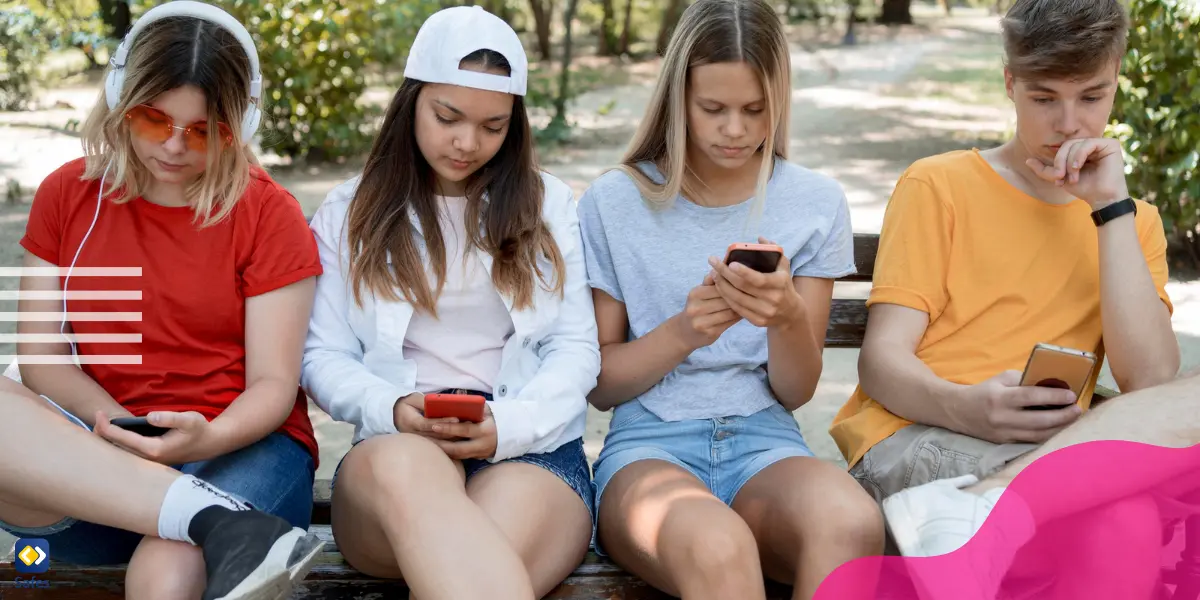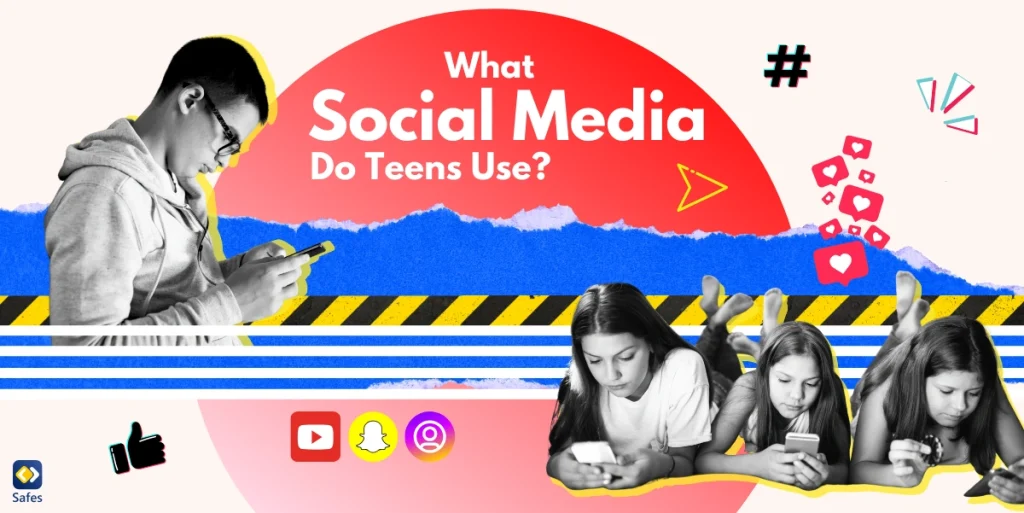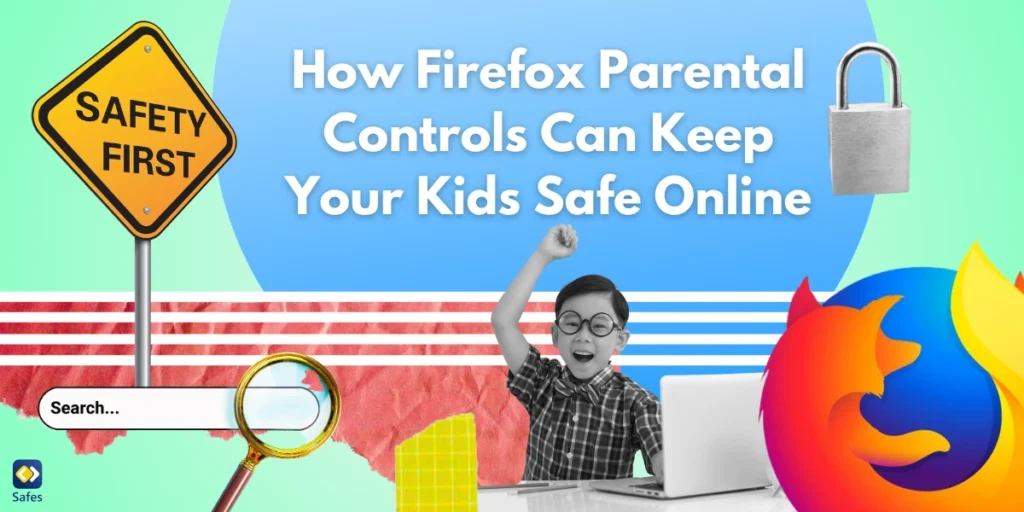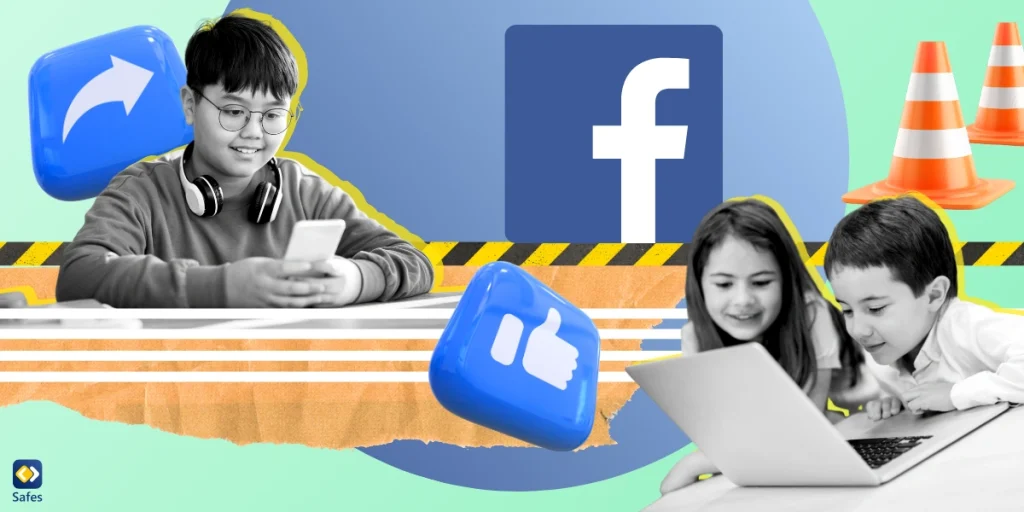As a parent, you want to ensure your teen is safe while using social media. But with so many platforms out there, it can be hard to keep up. From Snapchat to TikTok, teens are using social media in ways that might be unfamiliar to you. So, if you’re wondering “What social media do teens use?” this blog is for you! Here, we’ll help you understand what social media platforms teens are using and provide tips to keep your teen safe online.
Download and Start Your Free Trial of the Safes Parental Control App
Social media can be a great way for teens to connect with friends, share their thoughts, and explore their interests. However, it also comes with risks like privacy concerns, cyberbullying, and exposure to inappropriate content. As a parent, it’s important to stay informed about these platforms and understand how your teen is using them.
In this blog, we will explore the most popular social media platforms among teens, such as Instagram, Snapchat, TikTok, and others. We’ll explain what each platform is about, why teens love them, and what potential dangers they might pose. We will also provide practical safety tips that you can use to help protect your teen while they navigate the online world.
What Is the Most Popular Social Media for Teens?
If you were asking this question 10 years ago, the answer would be Facebook. Facebook was the go-to place for connecting with friends and sharing updates, photos, and videos. But nowadays, other platforms have overtaken it. This is how Social media trends change rapidly. However, based on social media statistics, several platforms stand out when discussing the most popular ones among teenagers:
- YouTube
- TikTok
- Snapchat
While these platforms are the most popular, teens also use other social media apps like Twitter, for quick updates and news, and Discord, for chatting with friends, especially about gaming. Each platform has its own special features and appeal, but they all offer ways for teens to express themselves and stay connected.

What Are the Possible Negative Effects of Social Media on Teens?
Social media has a big impact on teens, both positive and negative. On the positive side, it can enhance social connections, provide access to supportive friendships, and offer various services that can improve teen well-being, especially during crises. Social media helps teens develop digital skills essential for future economies and stimulates social interaction.
On the other hand, we can’t deny social media challenges for our beloved children. One study has shown a link between social media and teenagers depression. Additionally, excessive and uncontrolled social media and technology usage in teens can lead to addiction, cybercrime, mental health, and decreased face-to-face interactions
Does Social Media Have Benefits for Teenagers?
Do you think social media is toxic for teens and there’s no way they can benefit from these platforms? Well, there’s one thing you should know: social media does have benefits for teenagers, helping them communicate and socialize. Here are some of the key benefits:
- Connecting with Friends: Social media allows teens to stay in touch with friends, share experiences, and feel connected, even if they are far apart.
- Finding Support: Teens on technology can find communities and support groups for various interests and challenges. This can help them feel understood and less alone.
- Learning New Things: Social media provides access to a lot of information and resources. Teens can learn new skills, discover hobbies, and stay updated on current events.
- Expressing Themselves: Platforms like Instagram and TikTok give teens a space to express their creativity, share their thoughts, and showcase their talents.
- Building Digital Skills: Using social media helps teens develop important digital skills that are valuable in today’s technology-driven world.
- Opportunities for Growth: Social media can expose teens to different cultures, ideas, and perspectives, broadening their understanding of the world.
While social media has its risks, these benefits show that it can also be a positive force in a teenager’s life when used responsibly.

What Are the Most Important Safety Tips for Social Media?
In the previous section, we discussed the benefits of social media for teens and learned they’re not always about the consequences and negative impacts. However, it’s important to keep an eye on its reality and practice the safety tips.
Safety Tips on Instagram
- Set Privacy Settings: Ensure your teen’s Instagram account is set to private so only approved followers can see their posts. This limits who can view their content and interact with them.
- Monitor Followers and Following: Regularly check who your teen is following and who follows them. Encourage them to only accept follow requests from people they know personally.
- Review Tagged Photos and Posts: Teach your child to review photos and posts they are tagged in before they appear on their profile. This can help control what others post about them.
- Use Strong Passwords: Make sure they use a strong, unique password for their Instagram account and change it regularly to protect against hacking.
- Enable Two-Factor Authentication: Activate two-factor authentication for added security. This requires a code sent to your teen’s phone to log in, adding an extra layer of protection.
- Be Cautious with Personal Information: Advise your teen not to share personal information like their phone number, address, or school name on their profile or in posts.
- Report and Block Inappropriate Content: Show them how to report and block users who post inappropriate content or engage in bullying or harassment. Instagram has tools to report abuse, spam, and other violations.
- Limit Location Sharing: Their location should be off on their posts. This prevents others from knowing their exact location.
- Educate About Online Behavior: Talk to your teen about responsible online behavior and the importance of thinking before posting. Remind them that what they share online can have long-term consequences.
Safety Tips on TikTok
- Set Up a Private Account: Ensure their TikTok account is set to private so only approved followers can see their videos.
- Monitor Followers and Following: Regularly review who your teen is following and who follows them. Encourage them to only accept follow requests from people they know personally.
- Use Family Pairing: Use TikTok’s Family Pairing feature, which allows you to link your account to your teenager’s account. This enables you to manage screen time, set restrictions, and control direct messages.
- Control Comments: Adjust the settings to filter and manage comments on your child’s videos. You can restrict who can comment and use filters to block inappropriate words.
- Enable Screen Time Management: Use TikTok’s screen time management tools to set daily usage limits.
- Limit Direct Messages: Disable direct messaging for accounts under 16 or limit who can send messages to your teen.
- Educate About Privacy and Safety: Talk to your teen about the importance of not sharing personal information, such as their full name, address, phone number, or school name, in their profile or videos.
- Report and Block Inappropriate Content: Show them how to report and block users who post inappropriate content or engage in bullying or harassment. TikTok has tools to report abuse, spam, and other violations.
Safety Tips on Snapchat
- Privacy Settings: Your child’s Snapchat account should be “Private” so only friends they add can send them Snaps and view their Stories.
- Manage Friend Requests: Advise them to only accept friend requests from people they know in real life. Remind them that accepting requests from strangers can be risky.
- Location Sharing: Teach your teen to disable location sharing in Snapchat’s settings to prevent others from knowing their exact whereabouts. This can be found under “Ghost Mode” in the Snap Map feature.
- Limit Who Can Contact: Tell them to adjust their settings so only friends can contact them. This prevents unsolicited messages from unknown users.
- Reporting and Blocking: Show them how to block and report users who send inappropriate content or harass them. For that, they should tap on the user’s profile, select “More,” and then choose “Block” or “Report.”
- Be Cautious with Snaps and Stories: Remind them that Snaps and Stories can be saved by others using screenshots. Encourage them to think before sending anything they wouldn’t want to be shared more widely.
- Avoid Revealing Personal Information: Tell them that not sharing personal information like their address, phone number, school name, or full name in their Snapchat profile is highly important.
Safety Tips on YouTube
- Enable Restricted Mode: Activate YouTube’s Restricted Mode to filter out potentially mature content.
- Monitor Watch History: Regularly check their watch history to understand what they are viewing. This can help you identify any concerning content or patterns.
- Set Up Family Link: Use Google’s Family Link to manage and monitor their YouTube account. This allows you to set screen time limits, manage app installations, and review their activity.
- Educate About Privacy Settings: Teach them to adjust their privacy settings on YouTube. They can choose whether their videos are public, private, or unlisted, and manage comments and notifications.
- Discuss Cyberbullying Awareness: Talk to them about cyberbullying and encourage them to report any bullying or harassment they encounter on YouTube. Show them how to block and report users.
- Guide Responsible Content Creation: If your teen creates videos, discuss the importance of responsible content creation. Emphasize respecting others’ privacy and avoiding sharing personal information.
Final Word
Platforms like Instagram, TikTok, Snapchat, and YouTube offer different opportunities for connection, creativity, and learning. However, they may also have risks such as cyberbullying, exposure to inappropriate content, and privacy concerns. As parents, it’s essential to stay informed about our teens and technology. Setting privacy settings, monitoring online activity, and having conversations with your teen about responsible digital behavior are key steps in ensuring their safety online. Teaching them about the potential dangers and how to handle them empowers them to make smart choices.
At Safes, we understand the importance of safeguarding your teen’s online experience. Our parental control app provides tools like screen time management, content filtering, and real-time monitoring to help you protect your child while they explore social media and the internet. If you have experience using Windows parental controls or other devices, you’ll find features with unlimited access very helpful.
You can download Safes for Android and iOS, and start your free trial to experience peace of mind knowing your teen is safe online.
Your Child’s Online Safety Starts Here
Every parent today needs a solution to manage screen time and keep their child safe online.
Without the right tools, digital risks and excessive screen time can impact children's well-being. Safes helps parents set healthy boundaries, monitor activity, and protect kids from online dangers—all with an easy-to-use app.
Take control of your child’s digital world. Learn more about Safes or download the app to start your free trial today!




